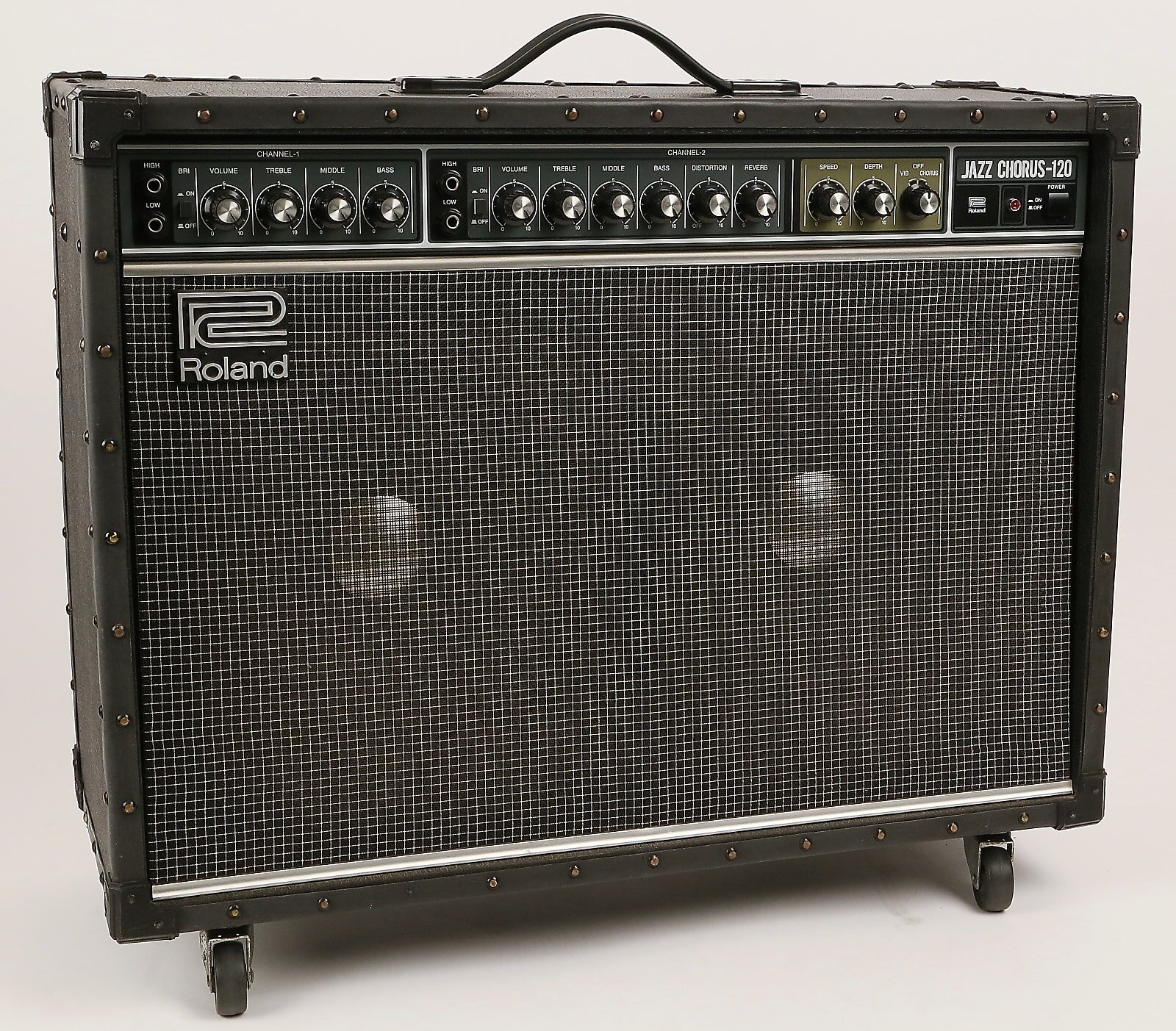Analog Man Mini Chorus
I begin this article by proudly declaring my unabashed love for chorus effects! While it may have been overused during its heyday and is not always my cup of tea in blues music, tasteful application of chorus can produce some of the most pleasing sounds.
The 80s, in particular, witnessed countless records across various genres, such as new wave, pop, and experimental music, that employed a flattering and captivating chorus.
The origins of chorus can be traced back to the Roland Jazz Chorus JC-120 amplifier. This solid-state amp introduced the world to the Roland CE-1 circuit, which provided a fantastic stereo-chorus effect.
Although I appreciate the Roland Jazz Chorus's sound, I used it less frequently at gigs. Its weight and the emergence of gigs where tube amps were better suited led me to explore alternatives.
For the longest time, I searched for that elusive CE-1 sound in a pedal without purchasing a vintage CE-1, partly due to my reservations about Boss buffers. Fortunately, my quest led me to the Retro-Sonic chorus pedal, a faithful recreation of the CE-1 circuit without the buffer. I adore the Retro-Sonic chorus and its ability to capture that vintage magic.
Grunge-worthy
In the 90s, I stumbled upon the Electro-Harmonix Small Clone chorus after being captivated by the guitar sound on Nirvana's "Lithium." I was fascinated to discover that "Lithium" drew inspiration from one of my favorite bands, Killing Joke. Their song "Eighties" featured a similar guitar sound and part. However, Geordie Walker of Killing Joke achieved the effect using an artificial doubling effect, which he still employs today.
Geordie Walker
On the other hand, Kurt Cobain used the Electro-Harmonix Small Clone for his chorus sound. I acquired one in the 90s and was generally pleased with its sound, although it felt somewhat flimsy in build quality. Unfortunately, the pedal eventually succumbed to wear and tear, with faulty switches and loose jacks leading me to part ways with it.
Despite its overall appeal, the perceived lack of durability and a subtle plastic-like tonal character contributed to my decision to abandon the Small Clone.
I had left my Small Clone chorus pedal with a friend, and when I saw him again years later at a gig, he handed it back to me in an even worse condition. Wires were falling out, and it was clear that the pedal had suffered from construction issues. Surprisingly, my friend hadn't used it much due to those issues. While I initially thought he had mistreated it, it turned out that the pedal's build quality was to blame.
This disappointed me because I had always loved the vibe of the Small Clone on records, and I thought it would complement the CE-1 circuit nicely. Both circuits utilize bucket brigade technology but offer distinct flavors.
The Holy Grail
I BECAME THRILLED when I discovered that Analog Man was producing the Mini Chorus: a reissue of the Small Clone circuit with improved components and upgrades. It was the perfect solution—I could now achieve the Small Clone tones I desired while having confidence in its construction for gigs and sessions. Unfortunately, touring with the original Small Clone was out of the question.
Analog Man has been manufacturing their chorus pedal for years, and I hadn't even known about it. So, I was elated when it arrived.
I opted for a few modifications, including a blend switch and a toggle to change the waveform used in conjunction with the depth switch. Since I work on various sessions and employ chorus on different sources, I wanted creative options at my disposal.
The Analog Man Mini Chorus is also less noisy than the Small Clone. It also has higher headroom than other chorus pedals I’ve used.
Apply Liberally
Aside from using chorus on guitar, I find immense joy in utilizing it on synthesizers such as the Sequential Circuits Prophet 10, Dave Smith OB-6, and ARP 2600M. Synths and chorus are a match made in sonic heaven.
While I predominantly use analog synths these days, my love for the Analog Man mini chorus is so strong that even when working with plugins, I reamp the signals through the pedal to achieve that authentic chorus sound. You can elevate the sound of plugin instruments by incorporating analog effects. For instance, I often route virtual Wurlitzer instruments through the Effectrode Delta Trem for its real tube tremolo and to enhance the overall tone through the circuitry.
With the addition of a reamp box, all of your pedal effects can seamlessly integrate with your plugins, transforming them into real-time virtual processors that enhance and shape your sound in exciting ways.
The Analog Man, Mini Chorus pedal, offers a wide range of sonic possibilities. It can provide subtle, almost Dimension D-style chorus effects or immerse you in a swirling sea storm of modulation.
Cream of the Crop
As someone who has been to my site before, you're likely aware of my admiration for Analog Man pedals. While numerous pedal manufacturers are in the market today, only a select few excel in both build quality and tone.
It's important to understand that creating a great pedal involves more than just following schematic and soldering components together. A skilled pedal builder deeply understands how the gear is meant to sound. For instance, Analog Mike has encountered and repaired countless fuzz pedals throughout his career. As a result, he has examined multiple units of the same build and understands the nuances that can either enhance or detract from a pedal's tone.
inside an Analog Man Mini Chorus
A talented pedal builder can discern how even minute variances can significantly impact the sound, and they pair components accordingly. This is why two fuzz pedals of the same circuit can sound different—they may represent different snapshots in the circuit's history, and the builder's knowledge of how the circuit is supposed to sound also plays a role.
Analog Man individually tests each pedal before shipping, ensuring it sounds right. They rely on more than just the fact that it was wired correctly. This meticulous attention to detail is especially crucial when it comes to fuzz pedals.
It is this level of commitment to quality that sets the Analog Man Mini Chorus apart. Over the years, I've experimented with numerous chorus pedals, including some more affordable options like the TC Electronics Corona Chorus. Initially, the Corona sounded good to my ears, but with time and gigging, I could not fully settle on its tone. I wasn't satisfied. I then explored other manufacturers, and while some pedals were well-built, they felt somewhat generic.
Individuality
Personally, I appreciate gear with personality. You will never hear me say, "It will get by." I bring my finest guitars and amps to even the smallest of gigs and sessions because that's what inspires me creatively.
Of course, there have been a few occasions in my career where I played at venues known for rowdiness—people spilling beer around and above my pedals.
On those nights, I didn't bring the gear I truly cherished, and I didn't enjoy the experience as much. But, overall, whenever possible, I strive to work in environments that allow me to use the tools I love as they contribute to my artistic expression. The Analog Man Bucket Brigade Mini Chorus is on my pedalboard anytime I need chorus.
Audio Examples
Signal chain:
Stratocaster with FSC ‘59 pickups running into the Analog Man Mini Chorus, Analog Man ARDX20 Analog Delay, Vox AC 15 amp, Ampete 88s amp switcher, UAD OX, Purple Audio MC77, UAD Luna.
Examples using a Sequential Circuits Prophet 10 running into an API 312 preamp, Purple Audio MC77, UAD Luna. In this example I played an arpeggiated part and played with the settings on the Analog Man Mini Chorus in realtime.
Hear more about the Analog Man Mini Chorus on my Anatomy of Tone Podcast episode 2













